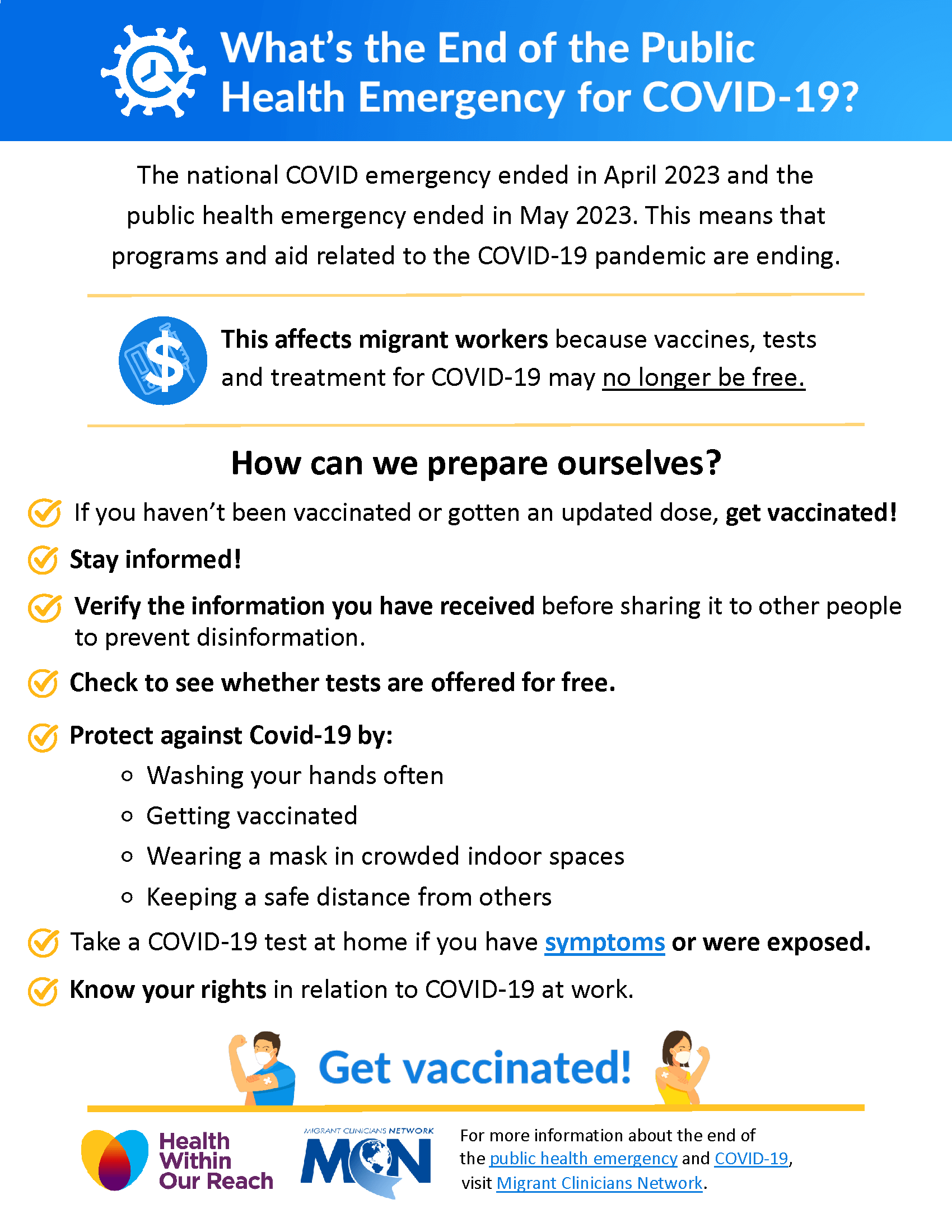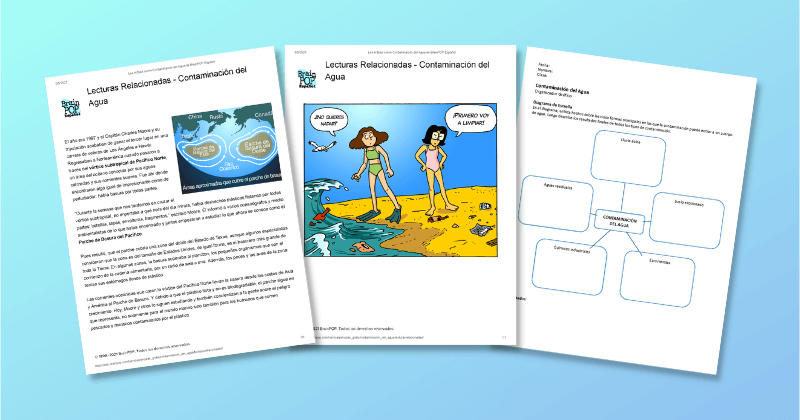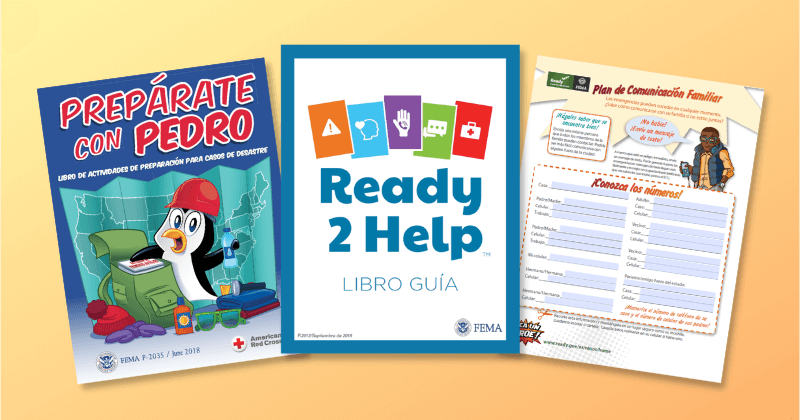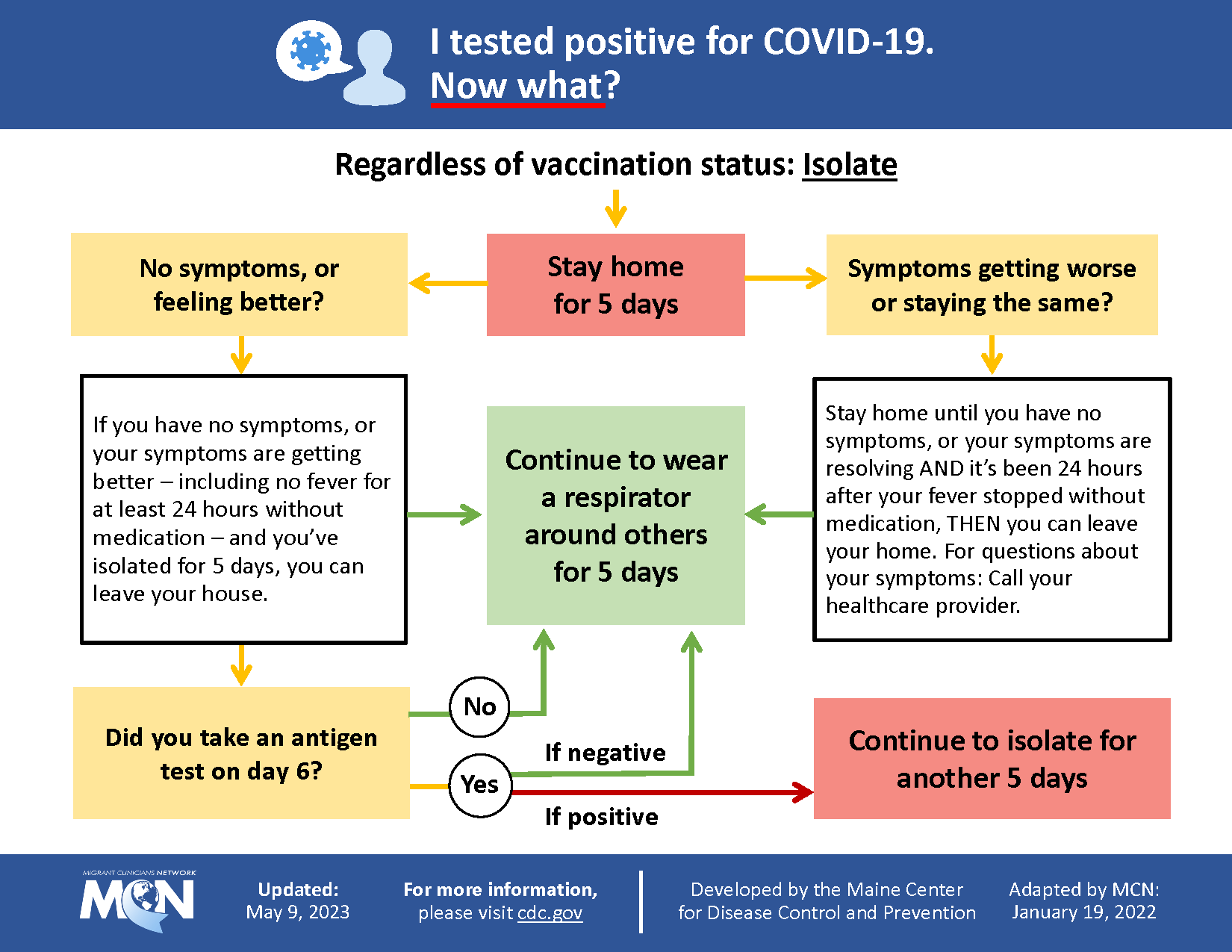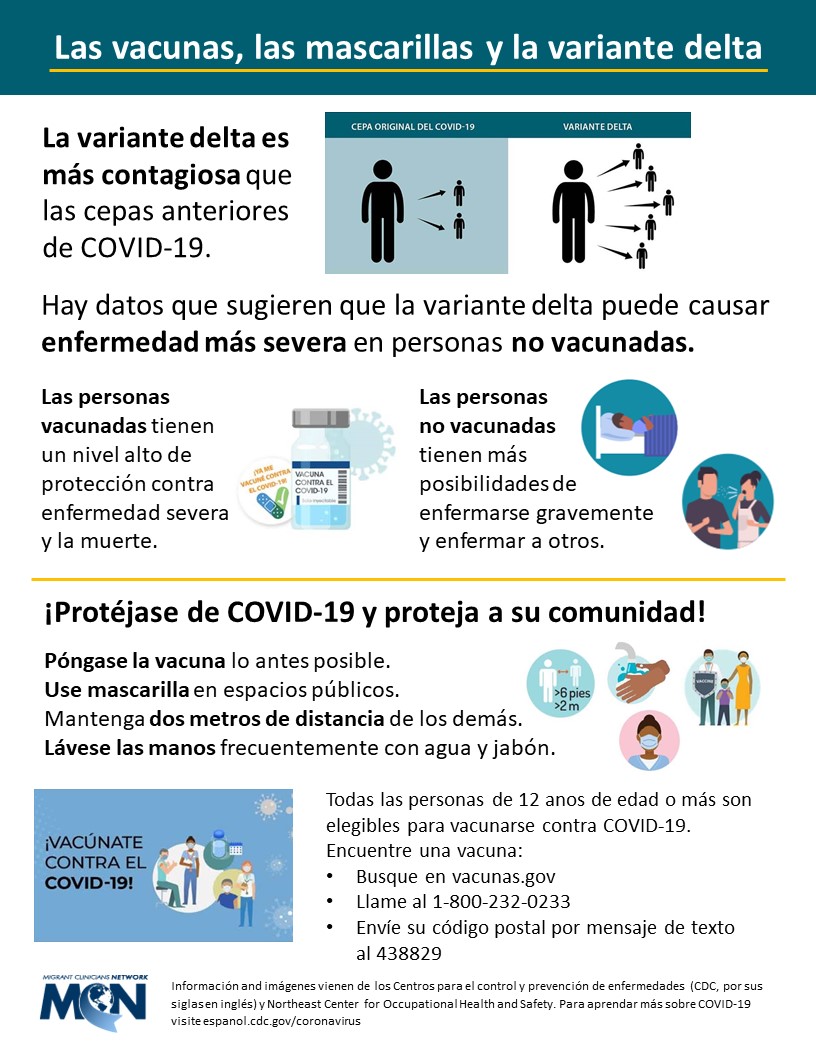Wildfire smoke poses a significant health risk, particularly for vulnerable populations such as farmworkers, given the nature of their jobs and their extended exposure to outdoor environments. This guide provides clinicians and community health workers (CHWs) with an overview of the effects of exposure to wildfire smoke, the reasons why farmworkers are more vulnerable to wildfire smoke, specific considerations for farmworkers, and practical strategies for preventive measures.
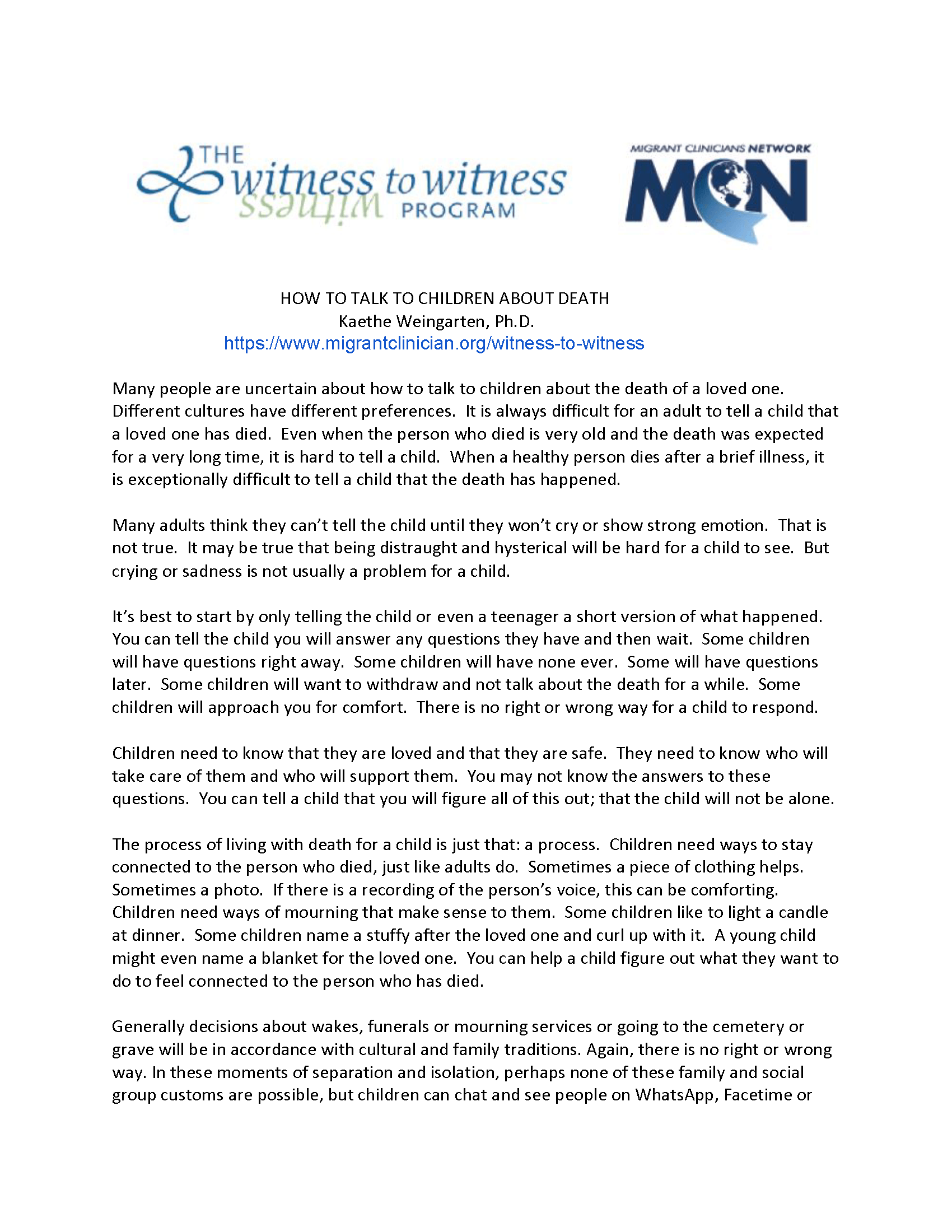
COVID-19 and Our Community: Better Safe Than Sorry! is an educational material to support the work of community health workers on COVID-19 and its prevention. It is complemented by a guide with concrete suggestions on how to use the flipchart and links to resources for those who want to delve deeper into the subject and investigate if there are any changes in the information.
The flipchart includes basic concepts of COVID-19, prevention and vaccination in the form of clear and simple messages that are supported by culturally appropriate illustrations to facilitate the process of communicating and transmitting information to community members. You can download these resources for free in both English and Spanish.
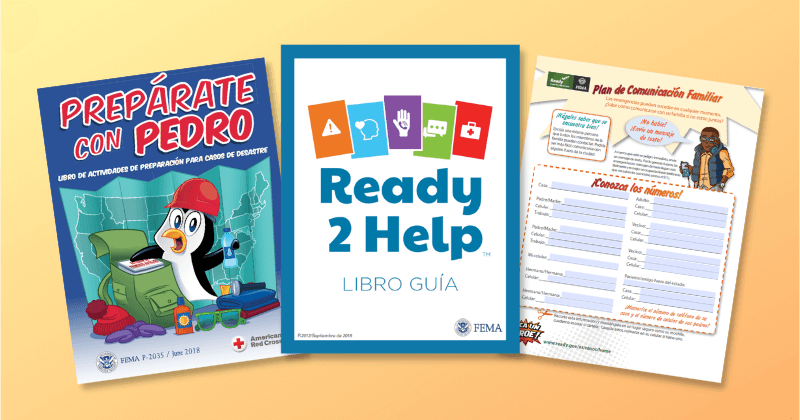
- Juego Ready 2 Help Guia.pdf (5.76 MB)
- Juego Ready 2 Help.pdf (1.09 MB)
- Preparate con Pedro - comic.pdf (6.21 MB)
- 12 formas de prepararse.pdf (288.86 KB)
- Documente y asegure su propiedad.pdf (1.35 MB)
- Plan de comunicacion familiar ninos.pdf (1.56 MB)
- Plan de comunicacion familiar padres completo.pdf (966.72 KB)
- Plan de comunicacion familiar padres.pdf (265.43 KB)
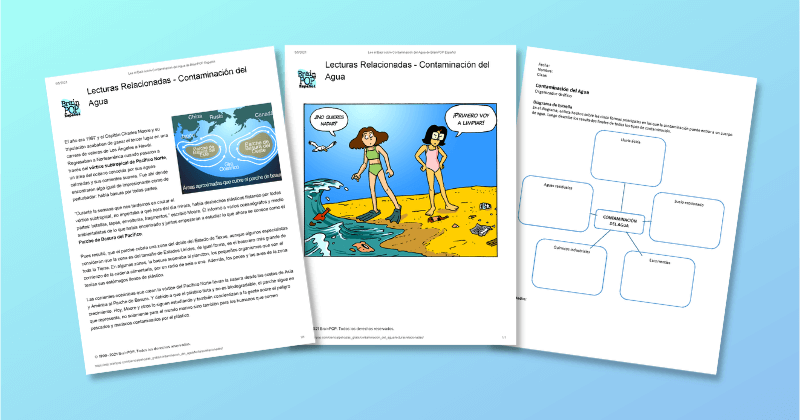
- Contaminacion del agua-Info1-La vuelta al mundo_0.pdf (246.73 KB)
- Contaminacion del agua-Info2-Personalidad_0.pdf (148.16 KB)
- Contaminacion del agua-Info3-Leyes y costumbres_0.pdf (124.07 KB)
- Contaminacion del agua-Info4-En la practica_0.pdf (147.93 KB)
- Contaminacion del agua-Info5-Comic_0.pdf (248.47 KB)
- Contaminacion del agua-Lluvia de ideas_0.pdf (77.55 KB)
- Contaminacion del agua-Organizador grafico_0.pdf (79.69 KB)
- Contaminacion del agua-Quiz_0.pdf (128.38 KB)
- Contaminacion del agua-Vocabulario_0.pdf (75.77 KB)
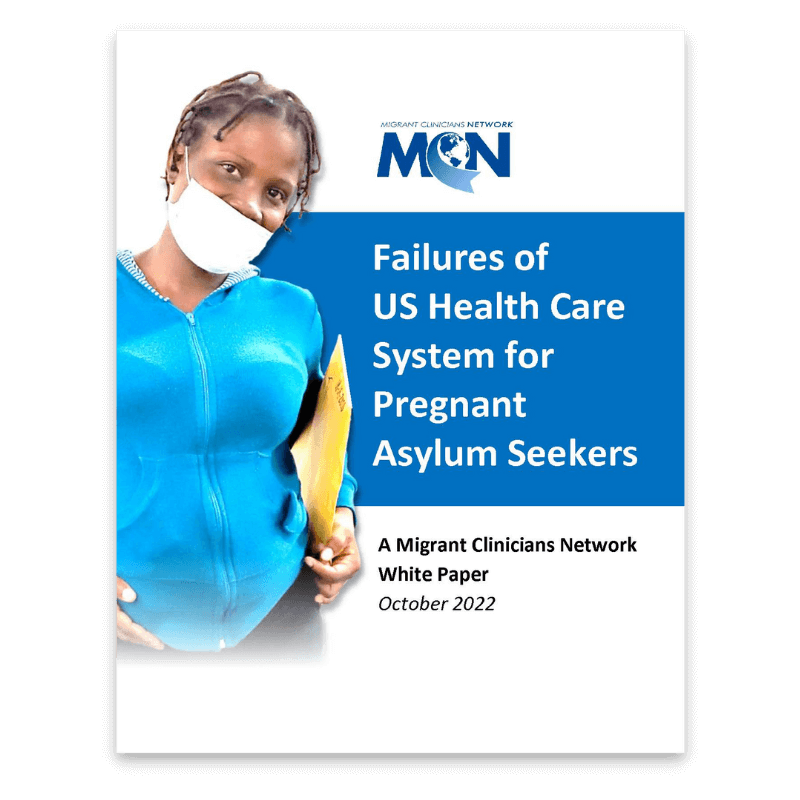
Migrant Clinicians Network's white paper, “Failures of US Health Care System for Pregnant Asylum Seekers,” outlines how pregnant asylum seekers who have been released into the US to await their asylum hearing face extreme obstacles to secure prenatal care, despite their legal presence within the country.
Without prenatal care, infants will not have the benefit of early screening and treatment for potentially life-threatening diseases and screening for congenital abnormalities, while in utero. Additionally, pregnancies without prenatal care may result in excess utilization of emergency services which produces unforeseen strain on the health care system.
Knowledge of prenatal care needs, cost, lack of insurance, transportation, refusal by health centers, and fear are delineated as key barriers for pregnant asylum seekers from accessing the care they need during their pregnancy.
Press contact: Claire Hutkins Seda, cseda@migrantclinician.org.
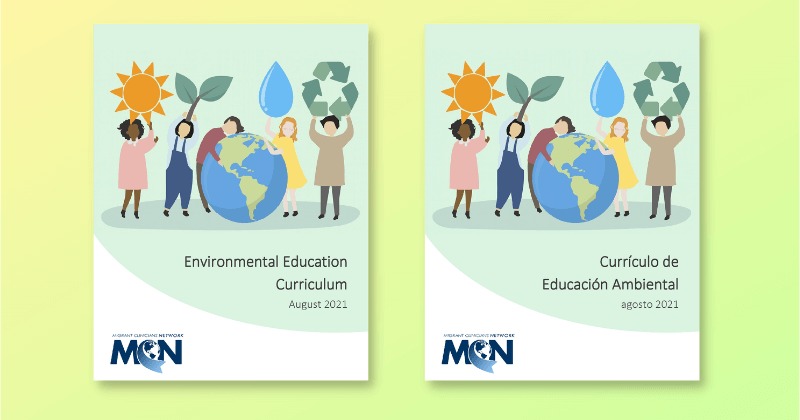
The primary goals of this project to be achieved through this curriculum are:
1) Increasing the capacity of students and community to think critically about environmental problems and the related decisions that affect human health and the environment as it relates to disaster preparation and response;
2) Increase community participation and collaboration with the goal of improving protections for human health and the environment as it relates to disaster preparation and response; and
3) Ensure chemical safety and safe water as it relates to disaster preparation and response.
Videos
- Currículo de educación ambiental: In this Spanish-language presentation, Alma Galván, MCH, Senior Program Manager of Occupational Health, provides an introduction to MCN’s environmental education curriculum presented in Puerto Rico.
- Agua Segura y seguridad con químicos: In this Spanish-language environmental education presentation, MCN’s Myrellis Muñiz-Márquez, MPH, Program Manager in Puerto Rico, shares tools to stay safe from chemical exposure, contaminated water, and non-point source pollution, before, during, and after a disaster.
- Emergencias y desastres: In this Spanish-language environmental education presentation, MCN’s Marysel Pagán-Santana, DrPH, MS, Senior Program Manager in Puerto Rico, identifies the environmental and health risks of disasters and encourages prevention measures and planning to protect individual and community health during and after emergencies.
Materials
Safe Water | Environmental Education Resources
Emergency and Disaster Management | Environmental Education Resources
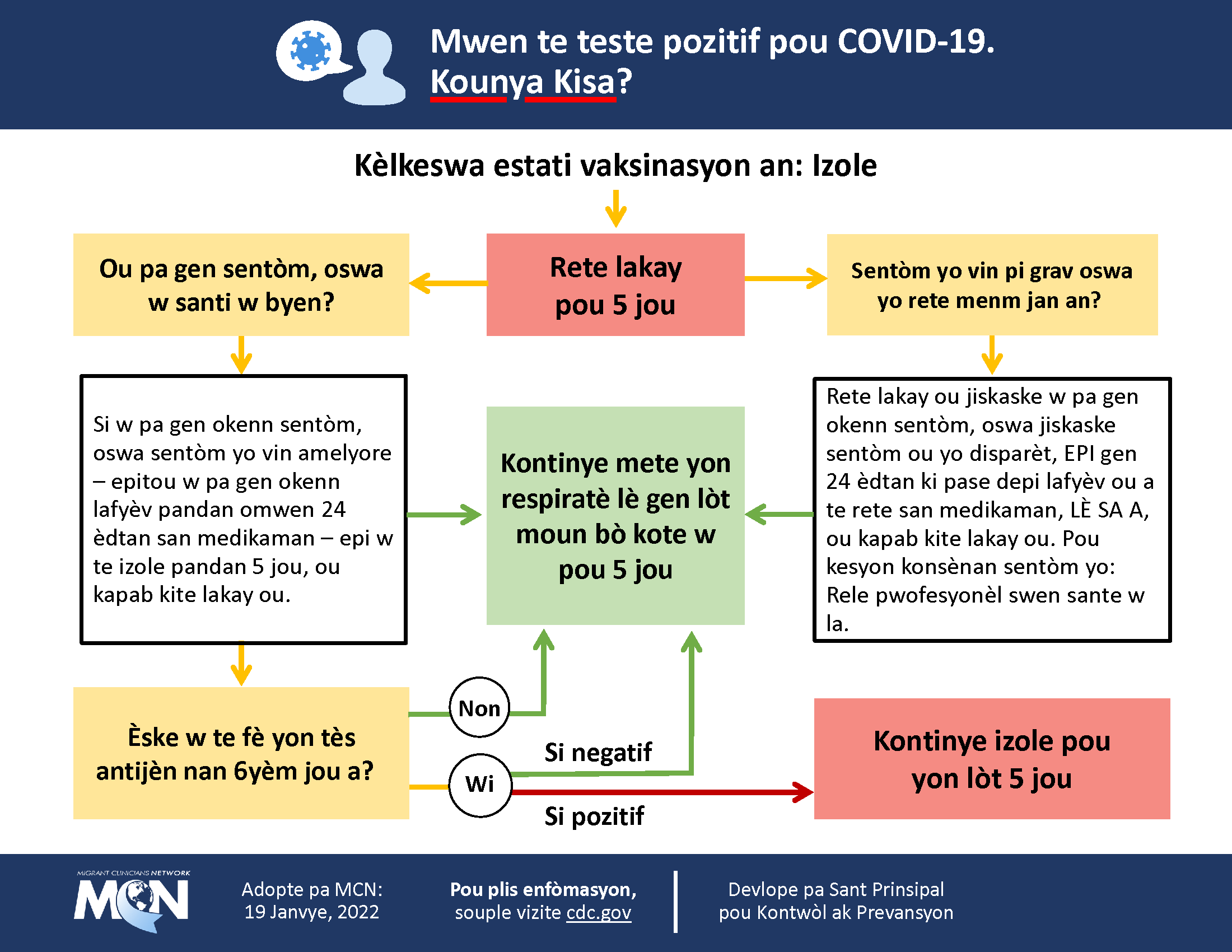
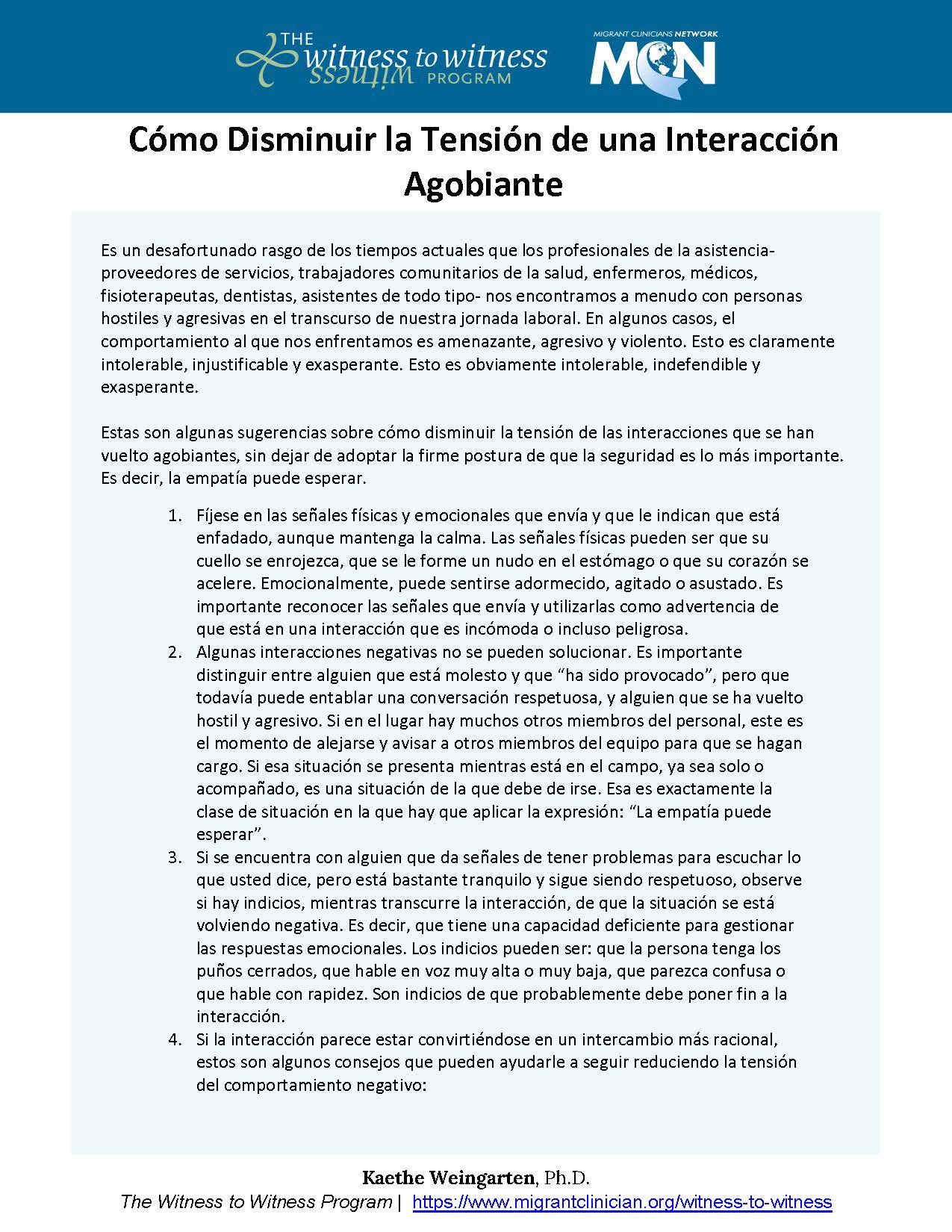
READ IN ENGLISH
El mundo continúa lidiando con COVID-19 y no se alcanza la inmunidad colectiva y el escepticismo, resistencia y vacilaciones sobre las vacunas continúa representando un gran obstáculo. Durante los primeros meses del esfuerzo de vacunación, el cineasta Chris Newberry y su equipo siguieron a un conjunto diverso de profesionales de la salud mientras ganaban la confianza de las comunidades en riesgo en todo Minnesota. El documental resultante es un tributo a los médicos, enfermeras, organizadores y personas influyentes que están adoptando los esfuerzos liderados por la comunidad para superar las dudas sobre las vacunas.
Las guías de discusión para el documental se pueden encontrar aquí: Ingles / Español
Conversación con los creadores de la película y un panel de expertos:
Quien desee ponerse en contacto con los productores con preguntas o ayuda en la organización de su propio evento VOCES DE CONFIANZA, puede contactarnos aquí:
- 2023-5-9_I-Tested-Positive-COVID_Flowchart.pdf (105.16 KB)
- 2023-5-9_I-Tested-Positive-COVID_Flowchart.png (34.13 KB)
- 2023-5-9_He-dado-positivo-a-COVID19-Que-hago-ahora_0.pdf (106.22 KB)
- 2023-5-9_He-dado-positivo-a-COVID19-Que-hago-ahora_imagen_0.png (34.83 KB)
- 2023-6-30_Mwen-te-teste-pozitif-pou-COVID-19_Resous.pdf (102.83 KB)
- 2023-6-30_Mwen-te-teste-pozitif-pou-COVID-19_Resous.png (51.97 KB)
- 2024-08-05_Modèl_depliyan_sou-vaksen-COVID-pou Timoun1.pdf (601.66 KB)
- 2024-08-05_Modèl_depliyan_sou-vaksen-COVID-pou Timoun1.pptx (7.57 MB)
- 2024-08-05_Children-COVID-Vaccine-Trifold_Handout_Template1.pdf (638.71 KB)
- 2024-08-05_Children-COVID-Vaccine-Trifold_Handout_Template1.pptx (9.99 MB)
- 2024-08-05_Niños-COVID-Vacuna-Tríptico_Material-de-apoyo_Plantilla1.pdf (666.67 KB)
- 2024-08-05_Niños-COVID-Vacuna-Tríptico_Material-de-apoyo_Plantilla1.pptx (7.58 MB)
This resource provides parents with instructions on ways you can help prevent the COVID-19 virus from transmitting to children, including information about approved vaccines for each age group. Additionally, it provides resources for more information including places you can go to get your child vaccinated. This resource is available in pre-made and template format, and in three languages including English, Spanish, and Haitian Creole.
- 2024-08-05_Children-COVID-Vaccine-Trifold_Handout_Template1.pdf (638.71 KB)
- 2024-08-05_Children-COVID-Vaccine-Trifold_Handout_Template1.pptx (9.99 MB)
- 2024-08-05_Niños-COVID-Vacuna-Tríptico_Material-de-apoyo_Plantilla1.pdf (666.67 KB)
- 2024-08-05_Niños-COVID-Vacuna-Tríptico_Material-de-apoyo_Plantilla1.pptx (7.58 MB)
- 2024-08-05_Modèl_depliyan_sou-vaksen-COVID-pou Timoun1.pdf (601.66 KB)
- 2024-08-05_Modèl_depliyan_sou-vaksen-COVID-pou Timoun1.pptx (7.57 MB)
This resource provides information regarding COVID-19 vaccination and pregnancy. It confirms that the COVID-19 vaccine is completely safe to receive before, during, and after pregnancy. Additionally, it provides resources for more information including places you can go to receive a vaccination, and overviews vaccine effectiveness and COVID-19 prevention. This resource is available in pre-made and template format, and in three languages including English, Spanish, and Haitian Creole.
- 2024-08-05_Pregnancy-COVID-Vaccine-Trifold_Handout_Template.pdf (548.41 KB)
- 2024-08-05_Pregnancy-COVID-Vaccine-Trifold_Handout_Template.pptx (9.65 MB)
- 2024-08-05_Embarazo-COVID-Vacuna-Tríptico_Material-de-apoyo_Plantilla.pdf (587.29 KB)
- 2024-08-05_Embarazo-COVID-Vacuna-Tríptico_Material-de-apoyo_Plantilla.pptx (9.65 MB)
- 2024-08-05_Model_depliyan_sou-vaksen-COVID-pou-fanm-ansent.pdf (548.78 KB)
- 2024-08-05_Model_depliyan_sou-vaksen-COVID-pou-fanm-ansent.pptx (9.64 MB)
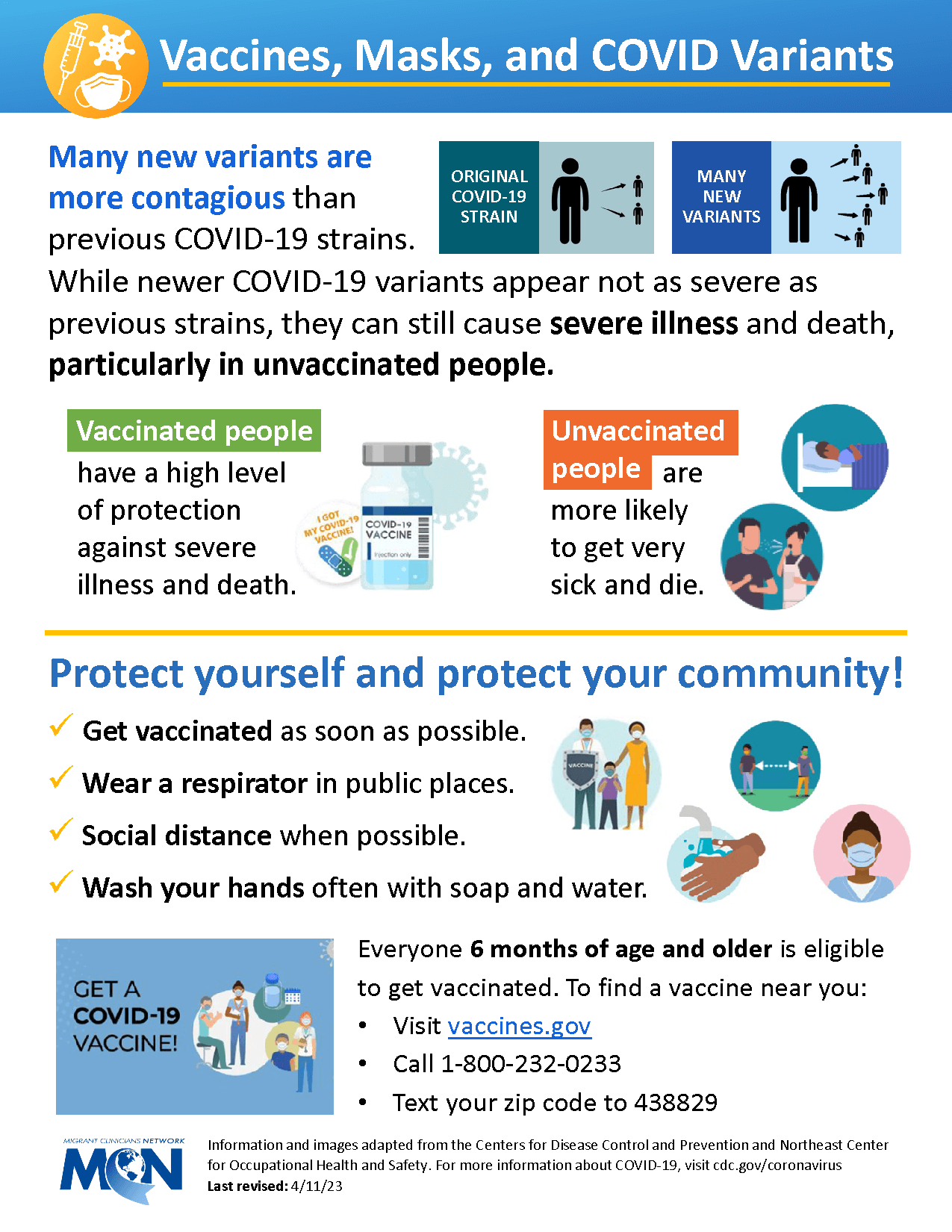
This resource provides information confirming the safety and effectiveness of the COVID-19 vaccine. It also includes recommendations for receiving the vaccine and COVID-19 prevention. This resource is available in pre-made and template format, and in three languages including English, Spanish, and Haitian Creole.
- 2024-08-05_General-COVID-Vaccine-Trifold_Handout_Template1.pdf (450.47 KB)
- 2024-08-05_General-COVID-Vaccine-Trifold_Handout_Template1.pptx (5.03 MB)
- 2024-08-05_General-COVID-Vacuna-Tríptico_Material-de-apoyo_Plantilla1.pdf (446.88 KB)
- 2024-08-05_General-COVID-Vacuna-Tríptico_Material-de-apoyo_Plantilla1.pptx (5.02 MB)
- 2024-08-05_Modèl_depliyan_sou-vaksen-COVID-Jeneral.pdf (413.37 KB)
- 2024-08-05_Modèl_depliyan_sou-vaksen-COVID-Jeneral.pptx (4.92 MB)
This colorful vaccine calendar comic gives low-literacy information on vaccines and some information on why adults need immunizations, too. Available in high resolution to download and print into poster size.
This almost real-time map shows where COVID-19 cases have been reported, all over the world, which provides some perspective and allows for a visual understanding of the spread as it progresses.
NACHC’s new FAQ runs down a number of additional resources not covered here, specifically tailored for health centers.
HRSA’s new COVID-19 FAQs give some overview on the health center requirements around emergency preparedness as well as recommendations for communications from health centers.
This new poll, taken by Migrant Clinicians Network in January and February 2018, reflected the experiences of clinical staff from 26 states across the country. Respondents came from every corner of the clinic; occupations listed include Physician, Executive Director, Dental Assistant, Outreach Specialist, Therapist, Community Health Worker, Registered Nurse, and 24 other occupations. The poll follows up on MCN’s 2017 poll, in which 63 percent of respondents indicated that immigrant and mobile patients’ attitudes and feelings toward health care access had changed.
- Poll Results February 2018.pdf (92.89 KB)
California's Medical Supervision Program is a biomonitoring program that measures cholinesterase activity in bloog samples from agricultural workers. Employers are required by law to contract with physicians who have registered for this program, all of whom are included in this list.
Safety and Health Practicesfor Nail Salon Workers and a Training Guide for Nail Salon Worker Safety and Health Outreach Program
- Best_Practices_HOPE.pdf (230 KB)
- Trainer_Guide_HOPE.pdf (1.34 MB)
Includes EPA manual "How to Comply With the 2015 Revised Worker Protection Standard For Agricultural Pesticides - What Owners and Employers Need To Know" and an excerpt specifically for clininicians regarding medical evaluation and respirator fit test. See also the medical evaluation questions in English and Spanish.
